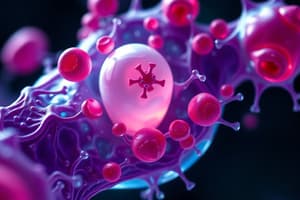Podcast
Questions and Answers
What is the primary function of the cell membrane in an animal cell?
What is the primary function of the cell membrane in an animal cell?
- To store nutrients and waste products
- To control the entry and exit of substances (correct)
- To synthesize proteins
- To produce energy
Which process involves the conversion of sugars into alcohol or acids to generate energy?
Which process involves the conversion of sugars into alcohol or acids to generate energy?
- Fermentation (correct)
- Respiration
- Photosynthesis
- Osmosis
What is the characteristic of cells that have a higher surface area to volume ratio?
What is the characteristic of cells that have a higher surface area to volume ratio?
- They are more prone to cell division
- They are typically larger in size
- They are more efficient in nutrient uptake and waste removal (correct)
- They have a lower surface area to volume ratio
What is the function of the ribosome in a cell?
What is the function of the ribosome in a cell?
What is the key difference between prokaryotic and eukaryotic cells?
What is the key difference between prokaryotic and eukaryotic cells?
What is the purpose of food preservation techniques?
What is the purpose of food preservation techniques?
What is the equation for respiration in cells?
What is the equation for respiration in cells?
What is the primary function of the chloroplast in a plant cell?
What is the primary function of the chloroplast in a plant cell?
Which organelle is responsible for photosynthesis in plant cells?
Which organelle is responsible for photosynthesis in plant cells?
What is the primary purpose of salting as a food preservation technique?
What is the primary purpose of salting as a food preservation technique?
In an experiment, what is the variable that is deliberately changed by the researcher?
In an experiment, what is the variable that is deliberately changed by the researcher?
What is the term for the consistency of results over repeated trials?
What is the term for the consistency of results over repeated trials?
Which stage of mitosis involves the separation of sister chromatids?
Which stage of mitosis involves the separation of sister chromatids?
What is the byproduct of yeast fermentation?
What is the byproduct of yeast fermentation?
Which process involves the breakdown of organic matter to recycle nutrients?
Which process involves the breakdown of organic matter to recycle nutrients?
What is the purpose of cytokinesis in both binary fission and mitosis?
What is the purpose of cytokinesis in both binary fission and mitosis?
Flashcards are hidden until you start studying
Study Notes
Cell Biology
- Osmosis: Movement of water molecules through a semi-permeable membrane from a lower solute concentration region to a higher solute concentration region.
- Ribosome: Cellular structure responsible for protein synthesis by translating messenger RNA into polypeptides.
- Fermentation: Anaerobic process where cells convert sugars into alcohol or acids to generate energy.
Cell Theory
- All living organisms are made up of one or more cells.
- The cell is the basic unit of structure and function in all living organisms.
- All cells come from pre-existing cells through cell division.
Equations
- Fermentation: Glucose → Alcohol + Carbon dioxide (in yeast), Glucose → Lactic acid (in muscles)
- Respiration: Glucose + Oxygen → Carbon dioxide + Water + Energy
Prokaryote and Eukaryote
- Prokaryote: Unicellular, no nucleus, smaller in size, DNA in a nucleoid region, example: Bacteria
- Eukaryote: Multicellular, has a nucleus, larger in size, DNA contained within the nucleus, example: Plants, animals
Surface Area to Volume Ratio
- Cells with a higher surface area to volume ratio can efficiently exchange materials with their environment
- Smaller cells typically have a higher ratio, which is advantageous for nutrient uptake and waste removal
Food Preservation Techniques
- Methods include refrigeration, freezing, drying, salting, canning, and pickling
- These techniques inhibit bacterial growth by altering conditions such as temperature, moisture, and pH
Cell Parts and Functions
- Animal Cell:
- Nucleus: Contains genetic material
- Mitochondria: Produces energy
- Ribosome: Synthesizes proteins
- Cell membrane: Controls entry and exit of substances
- Plant Cell:
- Chloroplast: Photosynthesis
- Cell wall: Provides structure and support
- Vacuole: Stores nutrients and waste products
Differences Between Plant and Animal Cells
- Plant Cells:
- Have a cell wall
- Contain chloroplasts
- Have a large central vacuole
- Animal Cells:
- No cell wall
- No chloroplasts
- Smaller vacuoles
Food Preservation Techniques
- Refrigeration/Freezing: Slows down microbial growth by lowering temperature
- Drying/Dehydration: Removes water, which is essential for microbial growth
- Salting: Draws out moisture through osmosis, creating an inhospitable environment for microbes
- Canning: Kills microbes by heating and seals the food in airtight containers
- Pickling: Uses acidic conditions to inhibit microbial growth
Practical Question
- Variables:
- Independent: Variable that is changed
- Dependent: Variable that is measured
- Controlled: Variables that are kept constant
- Data Reliability and Accuracy:
- Reliability: Consistency of results over repeated trials
- Accuracy: How close results are to the true value
- Graphing:
- Label axes, plot points, draw a line or curve
- Conclusion:
- Summarize the results and determine if the hypothesis is supported
Cell Division
- Binary Fission:
- DNA replication, chromosome segregation, cytokinesis
- Mitosis:
- Prophase, metaphase, anaphase, telophase, cytokinesis
Fermentation Word Equations
- Glucose → Ethanol + Carbon dioxide (Yeast)
- Glucose → Lactic acid (Muscle cells)
Usefulness of Microbes
- Decomposition: Break down organic matter, recycling nutrients
- Food Production: Used in making bread, yogurt, cheese, beer, and wine
- Medicine: Production of antibiotics, vaccines, and insulin
- Biotechnology: Genetic engineering, bioremediation
- Nitrogen Fixation: Convert atmospheric nitrogen into forms usable by plants
Studying That Suits You
Use AI to generate personalized quizzes and flashcards to suit your learning preferences.




